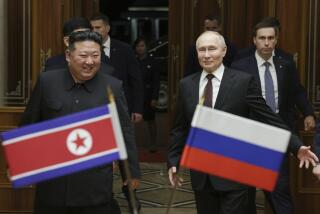Yeltsin in Beijing, Sees ‘New Era’ in Ties
BEIJING — Russian President Boris N. Yeltsin declared a “new era” in Sino-Russian relations as he arrived in China today for a three-day visit aimed at cementing a growing friendship between the two giant neighbors.
“Decades of stagnation and the absence of cooperation between two mighty nations” with such an immense common border “are unnatural,” Yeltsin told reporters after stepping off his presidential plane, the Rossiya.
The Russian president said his visit to China is also meant to underscore a shift in Russian foreign policy toward cultivating the East and overcoming traditional leanings toward Western Europe and America.
“We are often accused of always looking toward the West,” he said. “And now we are making a second breakthrough to the Asian countries, the Pacific region, Korea and now China. Of course, this gives a balance to our foreign policy.”
Chinese President Yang Shangkun accorded Yeltsin an elaborate welcome in the Great Hall of the People on Tian An Men Square and chatted with him for 40 minutes over tea.
“Relations between the two countries are developing smoothly in all fields,” Yang said, according to a report by the official New China News Agency, which paraphrased his comments. “China and Russia are complementary in their economies, with great cooperative potentialities. Vast vistas exist for further promotion of friendly cooperation between the two countries.”
The two nations are developing a “new-style relationship” based on “good-neighborly relations of friendship and mutual benefit and cooperation,” Yang said. He described Yeltsin’s three-day visit as “a big event.”
The two nations are expected to sign as many as 20 documents on cooperation during Yeltsin’s visit. The Russian president will also tour the southern special economic zone of Shenzhen before returning home.
Yeltsin’s trip promises to provide a much-needed lift for him in the wake of his major battle with his conservative Parliament; that battle cost him his reformist prime minister, Yegor T. Gaidar, on Monday.
Yeltsin’s visit stirred no controversy in Russia, despite lingering popular condemnation of Chinese human rights violations and a growing tendency by hard-liners to criticize his foreign policy. On the contrary, one Western diplomat in Moscow noted that by going to China, Yeltsin could please liberals and hard-liners--liberals by taking notes on successful Chinese economic reforms that could be applied in Russia and hard-liners by providing a counterbalance to what they perceive as his bias toward the West.
Yeltsin’s plan to visit the market-oriented zone of Shenzhen carries special relevance this week because the centrists who helped defeat Gaidar at the Congress and install the more conservative Viktor S. Chernomyrdin often refer to “the Chinese model” as an alternative to the painfully radical Russian reforms of the last year.
Russian officials said Wednesday that they expect Chernomyrdin to impose more government control on the economy and perhaps even effect a return to more centralized distribution of resources and supplies.
But it is too late, they said, for the Chinese model. China has largely managed to reform its Communist economy “through evolution, and that is a unique experience,” said Mikhail Bely of the Russian Foreign Ministry. “We have embarked on another road, and it would be absurd to go back and follow the Chinese way.”
Economic questions are expected to occupy Yeltsin and his Chinese hosts almost to the exclusion of the main questions that used to preoccupy the two nations--decades of confrontation on the world’s most militarized border and an ideological rift that has appeared to grow since Russia dumped communism.
Chinese media coverage of Yeltsin’s visit has taken an unusually friendly tone, reflecting not only the generally positive state of Sino-Russian ties but also a decision by Beijing’s hard-line Communist leadership to promote good relations, despite Yeltsin’s own anti-Communist record. This is part of a general pattern of China seeking to establish good ties with all states of the former Soviet Union.
More to Read
Sign up for Essential California
The most important California stories and recommendations in your inbox every morning.
You may occasionally receive promotional content from the Los Angeles Times.










